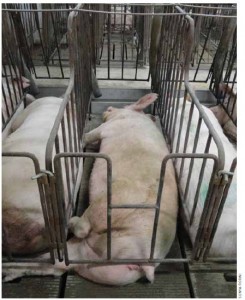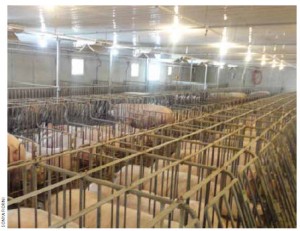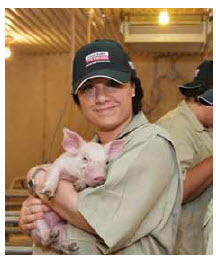
As the country’s largest food retailer, Loblaw has a very real impact on what and how Canadians eat. Over the past several years, animal welfare has been on our corporate social responsibility agenda as part of our sourcing-with-integrity principle. We have spent time investigating the issues with various stakeholders; we’ve visited numerous farms, dedicated resources to get involved and uncovered the facts by getting the full picture and taking a holistic approach.
I have visited both pig and egg layer farms to view first-hand some of the conditions in which these animals are housed. What I saw were dedicated farmers who are trying to do the right thing and produce healthy animals for us to consume, all within a fragile industry. Many of them are second or third generation farmers who take the welfare of their animals seriously. However, the demands of consumers are changing and there is a need for the pork industry to evolve.

Prior to 2013, Loblaw committed to working with industry associations, experts and our vendors to establish animal welfare best practices and standards. I’m pleased to say we have made a commitment to phase out sow stalls by the year 2022 and further expand our free-run egg offerings this year.
Grocery retailers share a healthy competitive relationship, but should not compete when it comes to the welfare of animals. There is a lot of good that is being done by working together to foster positive change.
An example of this is the recent commitment we spearheaded in the spring of 2013 with seven other grocery members who belong to the Retail Council of Canada. The idea was to source fresh pork products from sows raised in alternative housing by the end of 2022. In addition to Loblaw, members backing the commitment include major food retailers: Co-op Atlantic, Canada Safeway, Costco Wholesale Canada, Federated Co-operatives Limited, Metro Inc., Sobeys Inc., and Walmart Canada Corp.

This commitment acknowledges the economic challenges for producers of shifting to new housing systems. The signatories pledge to work with farmers and suppliers to find practical solutions that maintain viable farms. It does not call for an immediate shift from sow stalls, which could have a negative impact on pig welfare and pork producers. Rather, it provides for transition over a period of nine years.
The pork industry has a tremendous opportunity to innovate to new systems that can improve the welfare of pigs. But not all industry members will see it this way. They will require substantial capital investments to physically change barns, but also considerable human resources to choose the right system and train workers to a new way of handling animals.
Those are real and important considerations. However, the opportunity lies in the potential to differentiate the Canadian pork market for the better in the long run and position itself well into the future. Our primary objective is to provide our customers with choice and increasingly, we are hearing from them that they expect improvements in the handling and housing of animals raised for food.
We are pleased with the response we received from the Canadian Pork Council following the announcement of the commitment: “The grocers’ decision represents an opportunity for retailers and hog producers to work together and manage changes to sow housing.” Feedback like that is important to Loblaw because we have spent considerable time and effort attempting to balance the requests of our customers, the pork industry and animal-rights advocates. We have also been pleased to receive support from several animal-rights advocates, which gives us confidence that we, and the retail food industry in Canada, have struck a good balance.
Animal welfare has always been important to Loblaw. With more than 14 million Canadians shopping in our stores every week, we have a big responsibility to garner our customers’ trust by striving to do the right thing. For many years, grocery retailers have been targeted by animal welfare advocates to put pressure on their supply chains and place these issues front and centre with their customers. We make decisions based on what the customer wants — lower prices, healthier choices, great value, quality and the ethical and sustainable sourcing of our products. So, in this case, we made the decision due to customer demand and because it was the right thing to do — much the same as our commitment to source 100-percent sustainable seafood.
Our 2022 phase-out timeline is an important step, but it is only a small piece of the larger effort under way, industry wide. Concerns for animal welfare reflect society as a whole and play a role in the entire value chain.
Loblaw is an associate member of the National Farm Animal Care Council (NFACC), a multi-stakeholder forum that facilitates the development of standard codes of practice for farm animals, including revising the current pig and egg layer codes of practice in Canada. This process provides a credible, science-based and balanced approach. NFACC’s board comprises a wide variety of stakeholders including industry, government and non-governmental organizations (NGOs). As members of NFACC, we can get a closer look and take part in the work they are doing. This organization is unique to Canada and has been very instrumental in engaging stakeholders in its mandate to revise the existing codes of practice for farm animals.
This past June, the NFACC released the highly anticipated new draft pig code of practice. Among the many recommendations in the code, is a phase-out of sow stalls, which was identified as a priority welfare issue. Currently in Canada, approximately 10 percent of sow barns conform to loose housing environments. It will require concerted investment to meet these new standards when they are adopted.
While there remains more to do, Loblaw has a clear commitment to source with integrity. Our actions are evidence of the progress being made in the area of animal welfare that will continue well into the future.
To learn more about Loblaw’s corporate social responsibility initiatives, please visit Loblaw-reports.ca
Sonya Fiorini is senior director, corporate social responsibility, for Loblaw Companies Limited.





